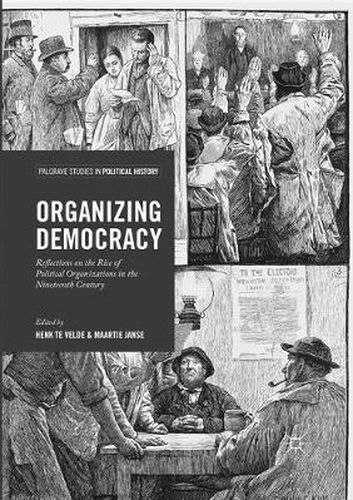Readings Newsletter
Become a Readings Member to make your shopping experience even easier.
Sign in or sign up for free!
You’re not far away from qualifying for FREE standard shipping within Australia
You’ve qualified for FREE standard shipping within Australia
The cart is loading…






This title is printed to order. This book may have been self-published. If so, we cannot guarantee the quality of the content. In the main most books will have gone through the editing process however some may not. We therefore suggest that you be aware of this before ordering this book. If in doubt check either the author or publisher’s details as we are unable to accept any returns unless they are faulty. Please contact us if you have any questions.
This book explores the new types of political organization that emerged in Western Europe and the United States during the nineteenth century, from popular meetings to single-issue organizations and political parties. The development of these has often been used to demonstrate a movement towards democratic representation or political institutionalization. This volume challenges the idea that the development of ‘democracy’ is a story of rise and progress at all. It is rather a story of continuous but never completely satisfying attempts of interpreting the rule of the people. Taking the perspective of nineteenth-century organizers as its point of departure, this study shows that contemporaries hardly distinguished between petitioning, meeting and association. The attraction of organizing was that it promised representation, accountability and popular participation. Only in the twentieth century did parties reliable partners for the state in averting revolution, managing the unpredictable effects of universal suffrage, and reforming society. This collection analyzes them in their earliest stage, as just one of several types of civil society organizations, that did not differ that much from each other. The promise of organization, and the experiments that resulted from it, deeply impacted modern politics.
$9.00 standard shipping within Australia
FREE standard shipping within Australia for orders over $100.00
Express & International shipping calculated at checkout
This title is printed to order. This book may have been self-published. If so, we cannot guarantee the quality of the content. In the main most books will have gone through the editing process however some may not. We therefore suggest that you be aware of this before ordering this book. If in doubt check either the author or publisher’s details as we are unable to accept any returns unless they are faulty. Please contact us if you have any questions.
This book explores the new types of political organization that emerged in Western Europe and the United States during the nineteenth century, from popular meetings to single-issue organizations and political parties. The development of these has often been used to demonstrate a movement towards democratic representation or political institutionalization. This volume challenges the idea that the development of ‘democracy’ is a story of rise and progress at all. It is rather a story of continuous but never completely satisfying attempts of interpreting the rule of the people. Taking the perspective of nineteenth-century organizers as its point of departure, this study shows that contemporaries hardly distinguished between petitioning, meeting and association. The attraction of organizing was that it promised representation, accountability and popular participation. Only in the twentieth century did parties reliable partners for the state in averting revolution, managing the unpredictable effects of universal suffrage, and reforming society. This collection analyzes them in their earliest stage, as just one of several types of civil society organizations, that did not differ that much from each other. The promise of organization, and the experiments that resulted from it, deeply impacted modern politics.